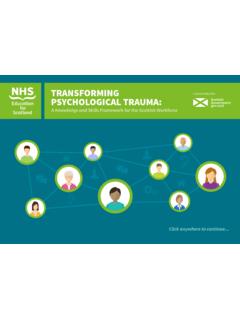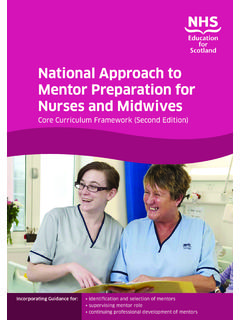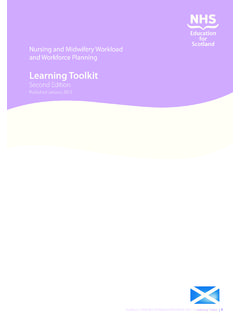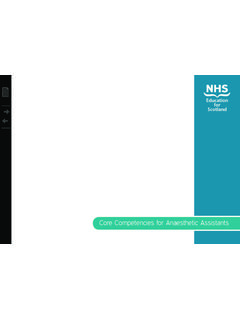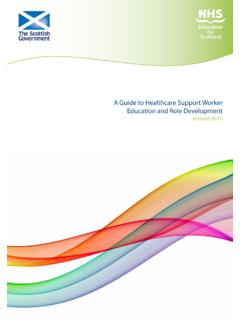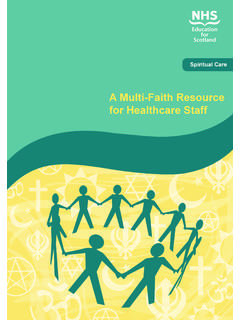Transcription of Mental Health in Scotland - NHS Education for …
1 Mental Health in ScotlandA Guide to delivering evidence-based Psychological Therapies in ScotlandThe Matrix 2011 The Matrix - 2011A Guide to delivering evidence-based Psychological Therapies in ScotlandUse the buttons below to navigate to the start of each section ContentsThe Matrix | A Guide to delivering evidence-based Psychological Therapies in Scotland ContentsIntroduction and Overview Summary Guidance on Well-functioning Psychological Therapies Services Targets and CommitmentsThe Purpose and Structure of this PaperCHAPTER 1 Delivering Psychological Therapies-The FundamentalsValues-based Care and a Recovery focusWhat are Psychological Therapies?
2 Psychological Therapies and the HEAT Access TargetDelivering evidence-based Psychological TherapiesThe key role of Psychological Therapies SupervisionMatched/Stepped care models of service deliveryPsychological Therapies-a role for all disciplinesCHAPTER 2 Service Structures and ProcessesStrategic PlanningService DeliveryIssues around Access to ServicesCHAPTER 3 - Training, Supervision and Governance Issues CHAPTER 4 - Support for Changes NHS Education for ScotlandTraining and Workforce DevelopmentHIS and the ICP ProcessImprovement Support for PTs HEAT Target DeliveryCHAPTER 5 Key Developmental Questions for Services.
3 CHAPTER 6 - The Matrix Evidence Tables- Summary of the Psychological Therapies Evidence BaseThe development of The Matrix Evidence TablesHow to use The Matrix Evidence TablesThe Evidence TablesAdult ServicesChildren and Young PeopleOlder Peoples ServicesPsychological Therapies for People with Learning Disabilities Forensic ServicesUse the buttons below to navigate to the start of each sectionAcknowledgementsIntroduction and OverviewThe Scottish Government is committed to increasing the availability of evidence-based psychological interventions, and the Local Delivery Plan Guidance for 2011-12 introduces for the first time a new maximum waiting times access target for Psychological Therapies.
4 Targets for Psychological Therapies, CAMHS and Alcohol Misuse will help tackle some of Scotland s biggest economic and social problems. The Reshaping Care and Mental Health Division is also committed to supporting NHS Boards to meet HEAT targets in a way which best fits with local services and circumstances and will be sustainable in the long term. The Matrix project grew out of requests from NHS Boards for advice on commissioning Psychological Therapies in local areas to enable them to plan and provide the most effective available psychological treatments for their particular patient population.
5 The Matrix is a guide to planning and delivering evidence-based Psychological Therapies within NHS Boards in Scotland . It provides a summary of the information on the current evidence base for various therapeutic approaches, a template to aid in the identification of key gaps in service, and advice on important governance issues. Introduction and Overview | The Matrix | A Guide to delivering evidence-based Psychological Therapies in Scotland 1 Use the buttons below to navigate to the start of each sectionThe Matrix has been produced to help NHS Boards: Deliver the range, volume and quality of Psychological Therapy required to achieve the HEAT Psychological Therapies Access Target, and to meet ICP accreditation standards.
6 Provide evidence-based psychological interventions in other key government priority areas; by Summarising the most up-to-date advice on evidence-based interventions; Providing information and advice on strategic planning issues in the delivery of efficient and effective Psychological Therapies services; Explaining the levels of training and supervision necessary for staff to deliver Psychological Therapies safely and effectively; and Describing the additional support available from Government in terms of related Mental Health initiatives-the Mental Health Quality and Efficiency Support Team (MH QuEST); Health Improvement Scotland (HIS) and the Integrated Care Pathway (ICP) process; the Information Services Division (ISD).
7 And NHS Education for Scotland (NES)As such, it aligns with the ambitions of the NHSS cotland Healthcare Quality Strategy, by promoting the delivery of efficient and effective treatments, and by seeking to minimise wasteful and harmful variations in practice through the clarification of training standards and supervision requirements. In addition it offers guidance on service structures and governance arrangements necessary to ensure patient safety. Expansion and Update of the Evidence TablesThe summary evidence tables in the current document cover Key areas within Adult and Older People s Mental Health services; Key areas within services for children, young people and families; and Some aspects of Long Term Conditions management and physical Health range of conditions covered by The Matrix evidence tables has been expanded since the original 2008 version, however the tables do not yet encompass all diagnoses or Mental Health patient groups.
8 We have continued to focus on common Mental Health problems and disorders, the conditions covered by the ICPs, and other key Scottish Government priority areas. Introduction and Overview | The Matrix | A Guide to delivering evidence-based Psychological Therapies in Scotland 2 Use the buttons below to navigate to the start of each sectionThe current version includes new or revised tables on the evidence base for the application of Psychological Interventions with Older People with Children and Adolescents with people with Learning Disabilities with Forensic populations for Trauma and PTSD for DepressionThe intention is to continue to extend the evidence tables over time to give more comprehensive coverage.
9 And to update the recommendations as new evidence becomes is no suggestion that NHS Boards should provide all of the therapies and interventions listed in the tables . For any patient group choices over which evidence-based intervention to deliver will have to be made locally, based on costs of training and sustainable service delivery, available expertise and existing strategic plans. It is expected that Psychological Therapies will be delivered within a matched/stepped-care model of service delivery, and this document should be read in conjunction with the publications outlining the competences necessary to provide safe and effective psychological care at different tiers of the system (See Chapter 3).
10 The document is not intended to be prescriptive, to replace local strategic planning processes or to stand alone. It is to be seen as guidance which will be adapted to local circumstances by local experts within the relevant strategic planning settings, such as multi-disciplinary Psychological Therapies strategic planning groups. Introduction and Overview | The Matrix | A Guide to delivering evidence-based Psychological Therapies in Scotland 3 Use the buttons below to navigate to the start of each sectionSummary Guidance on Well-functioning Psychological Therapies Services Psychological Therapies (PTs) services should be structured, staffed and governed in such a way as to meet people s expectations in terms of both waiting times and the quality of care they receive.
